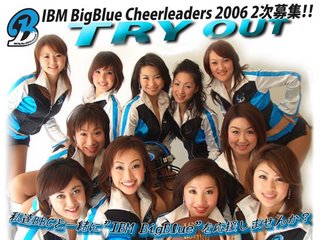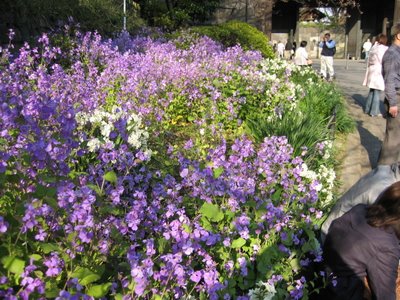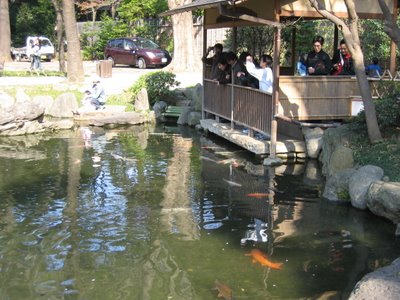Today I spent several hours at Roppongi Hills including a visit to the observation deck, a tour of the Mori Art Museum (highlighting works of art from Berlin and Tokyo from the 1880s through the present), and a stroll amongst the high-end shops. Yes, you too can own a pair of extremely expensive, ordinary looking pajamas.
The Mori Art Museum's curators found some remarkable pieces, and, despite my initial concerns, they handled the war years reasonably well. The exhibit featured paintings, photography, architecture, magazines, books, video, sculpture, furniture, and even mechanical "life forms." There were some pieces I still vividly remember. For example, a large painting ("B-29s") depicted American bombers high overhead, faintly visible, with a huge blue sky all around. There was some hint of disturbance, but mainly the overwhelming feeling of the piece was resignation. Another piece, a sculpture, contained materials from Auschwitz, including hair, what appeared to be dried human skin, and a searchlight. The searchlight, at the bottom of the piece, was pointed at the viewer, suggesting the Holocaust is an ongoing inspection of all humanity.
The one piece that I remember most vividly was Iwami Furusawa's "Demonic Music" (1948), a frightening blood red image of a nuclear explosion. Organ pipes rise from the top of the mushroom cloud, and horrific devils spew from their tops.
A new mainframe professional's modest musings on life, career, travels, politics, and more. The views expressed on this Web site are my own, not my employer's.
Saturday, April 29, 2006
Thursday, April 20, 2006
Excellent Raspberry, Hangzhou, Doctor Who
AM/PM switched the flavors, so now maple has given way to raspberry swirl. The flavor changed, but JSD is still serving.
Although I didn't have much time to enjoy the views during a brief trip Monday and Tuesday, I can recommend a visit to Hangzhou, China. A lake dominates the center of Hangzhou with trees, flowers, and other semi-natural beauty ringing the entire lake. Beijing was not what I'd call "beautiful" — although that's not necessarily a criticism — but Hangzhou is different. The pollution was a little less severe, too.
Season 2 of the new Doctor Who started airing this past Saturday on BBC domestic U.K. television. I particularly enjoy the multi-episode story arcs that work so well in genre television. The season's first episode, "New Earth," brings back the Face of Boe and Cassandra in a story about bioethics. This episode also sets up some unresolved plot elements to keep the audience anxious for more. For example, viewers learn the Face of Boe will return once only. Thank you, BBC, for bringing this classic series back under the able stewardship of Russell T. Davies.
Although I didn't have much time to enjoy the views during a brief trip Monday and Tuesday, I can recommend a visit to Hangzhou, China. A lake dominates the center of Hangzhou with trees, flowers, and other semi-natural beauty ringing the entire lake. Beijing was not what I'd call "beautiful" — although that's not necessarily a criticism — but Hangzhou is different. The pollution was a little less severe, too.
Season 2 of the new Doctor Who started airing this past Saturday on BBC domestic U.K. television. I particularly enjoy the multi-episode story arcs that work so well in genre television. The season's first episode, "New Earth," brings back the Face of Boe and Cassandra in a story about bioethics. This episode also sets up some unresolved plot elements to keep the audience anxious for more. For example, viewers learn the Face of Boe will return once only. Thank you, BBC, for bringing this classic series back under the able stewardship of Russell T. Davies.
Friday, April 14, 2006
Excellent Maple Ice Cream
There are convenience stores everywhere in Japan, but the AM/PM store here at the IBM office is a cut above the rest for two reasons: maple soft serve ice cream and the "surfer dude" working behind the counter who sells it.
The ice cream costs just 170 yen, so it's a good value in quality junk food. The optional caramel swirl is another 30 yen, and that's good, too. But the sheer entertainment value of Japanese Surfer Dude is worth at least 400 yen. Yesterday, when I ordered some of the good stuff, I happened to say "Excellent" as I received an extra large dose. JSD, in his best Bill & Ted's Excellent Adventure style, stuck his thumbs up and out and vigorously echoed, "EXCELLENT!"
JSD really enjoys his job. Customer service employees almost universally do in this service-oriented society. I know the feeling.
The ice cream costs just 170 yen, so it's a good value in quality junk food. The optional caramel swirl is another 30 yen, and that's good, too. But the sheer entertainment value of Japanese Surfer Dude is worth at least 400 yen. Yesterday, when I ordered some of the good stuff, I happened to say "Excellent" as I received an extra large dose. JSD, in his best Bill & Ted's Excellent Adventure style, stuck his thumbs up and out and vigorously echoed, "EXCELLENT!"
JSD really enjoys his job. Customer service employees almost universally do in this service-oriented society. I know the feeling.
Tuesday, April 11, 2006
Go Big Blue!
 IBM Japan sponsors a professional rugby team, an American-style football team (with a lovely IBM Big Blue cheerleading squad), and even the IBM Philharmonic Orchestra.
IBM Japan sponsors a professional rugby team, an American-style football team (with a lovely IBM Big Blue cheerleading squad), and even the IBM Philharmonic Orchestra.I guess it's further proof that IBM is both the largest and most diversified information technology company in the world. And if the sales representatives need more enthusiasm after a disappointing quarter, we've got cheerleaders!
The Earth Shook
We just had a minor earthquake here registering 5.1 on the Richter Scale. I was sitting in the big, open air office at IBM. It was odd seeing the walls move in relation to the ceiling, shrinking and enlarging those usually precise right angles for several seconds. The experience was similar to sitting aboard an airliner undergoing minor turbulence and watching the gap between the interior fuselage wall and the overhead bins expand and contract. At that moment one wonders how smart the structural engineers were.
As it happens I was having a conversation with an IBM technical specialist about risk, to put it simply. We had different opinions about how to manage risk in a specific customer situation, but I think we came to a tentative agreement after the earthquake.
As it happens I was having a conversation with an IBM technical specialist about risk, to put it simply. We had different opinions about how to manage risk in a specific customer situation, but I think we came to a tentative agreement after the earthquake.
Sunday, April 09, 2006
Tuesday, April 04, 2006
Cherry Blossoms & Bangkok
Japan is quite beautiful this time of year as spring begins. The justifiably famous cherry blossoms last many days, and people go to the parks to stake out prime picnic real estate to observe nature's beauty. The whole scene is a bit like Vermont's autumn foliage season. I spent some quality weekend time visiting one of Tokyo's many shrines, a couple parks, and my local neighborhood cherry blossoms to soak in the views. (Photos will appear soon.)
Last week I flew to Bangkok to meet with a major transportation-related company, and the meetings went well. While I was there the opposition parties launched several protests against the current government. The opposition parties asked their supporters to effectively vote "present" in the election on April 2, and they managed to significantly reduce the government's vote totals according to early results. Opposition forces demand the resignation of Thailand's prime minister for alleged corruption. The opposition had a great idea, I thought: use an upscale Bangkok shopping mall as their protest forum. The mall is quite comfortable, has plenty of restrooms, climate control and shelter, and it helps capture their criticism of the PM who also happens to be Thailand's wealthiest man and one of the few Thai who can shop at the fancy mall.
Thailand's newspapers were full of dire warnings about how the protests would disrupt life as we know it, but of course they were perfectly peaceful, and Bangkok's relatively new public transportation system kept the city moving even when the car traffic wasn't. My guess is that Thai newspaper barons like to sell newspapers.
Last week I flew to Bangkok to meet with a major transportation-related company, and the meetings went well. While I was there the opposition parties launched several protests against the current government. The opposition parties asked their supporters to effectively vote "present" in the election on April 2, and they managed to significantly reduce the government's vote totals according to early results. Opposition forces demand the resignation of Thailand's prime minister for alleged corruption. The opposition had a great idea, I thought: use an upscale Bangkok shopping mall as their protest forum. The mall is quite comfortable, has plenty of restrooms, climate control and shelter, and it helps capture their criticism of the PM who also happens to be Thailand's wealthiest man and one of the few Thai who can shop at the fancy mall.
Thailand's newspapers were full of dire warnings about how the protests would disrupt life as we know it, but of course they were perfectly peaceful, and Bangkok's relatively new public transportation system kept the city moving even when the car traffic wasn't. My guess is that Thai newspaper barons like to sell newspapers.
Subscribe to:
Posts (Atom)



